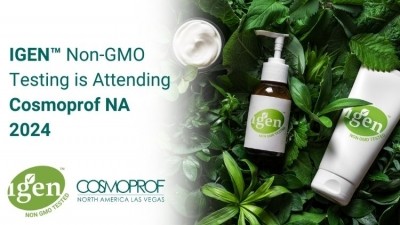Promotional Features
Non-GMO tested certification: A strategic advantage for forward-thinking cosmetic brands
In an era where consumers are increasingly vigilant about the ingredients in their personal care products, the cosmetics industry is seeking strategic and transparent ways to substantiate label claims.
As more individuals prioritize natural, safe and clean ingredients, the relevance of non-GMO (Genetically Modified Organisms) certification has surged. For cosmetics companies, achieving this certification can be a pivotal step in building trust, differentiating products, and gaining a competitive edge in an over-saturated market.
Beyond transparency, companies that are currently self-declaring non-GMO status can ensure these statements are factual and not misleading. Last year, there were over 700 warning letters issued by the Federal Trade Commission (FTC) to beauty and personal care brands regarding questionable marketing claims that required immediate correction.1
This article highlights the importance of the IGEN™ non-GMO tested certification for cosmetics, offering insights into consumer trends, the benefits for companies, and practical steps for obtaining certification.
Understanding GMOs and their impact
Organisms that have had their genetic material modified using genetic engineering techniques are called GMOs. While GMOs are primarily associated with food crops, they are also prevalent in various cosmetic ingredients, such as corn, soy, and cotton derivatives. For consumers seeking cleaner, more natural alternatives, the presence of GMOs in cosmetics is a significant issue.
When cosmetic brands transparently disclose the presence or absence of GMO ingredients in their products, consumers can make informed choices about the products they use. Some common GMOs found in cosmetics include:
- Canola and canola oil
- Citric acid
- Coconut oil
- Corn and corn oil
- Maltodextrin
- Papaya
- Proteins derived from yeast
- Soybean oil
The demand for transparency and natural ingredients in cosmetics has never been higher, driven by a growing awareness of potential health risks and a desire to support sustainable agricultural practices. Consumers today are not just looking for effective cosmetics; they want products that align with their values, including environmental sustainability and health consciousness.
Benefits of Non-GMO certification for cosmetics companies
Trust and transparency
In an industry where trust is paramount, a non-GMO certification, such as International Genetically Modified Organism Evaluation and Notification (IGEN) Non-GMO Tested, serves as a powerful tool for building consumer confidence. There are hundreds of cosmetics brands in the market that self-declare non-GMO status.
However, third-party certification from a reputable organization assures consumers that the product adheres to strict criteria, ensuring it is free from detectable modified genetic material. This transparency helps to build a loyal customer base that values honesty and integrity in product labeling.
Brand differentiation
With the cosmetics market being highly competitive, differentiation is crucial. For example, non-GMO producing products that do not contain detectable modified genetic material can provide a distinction that can be particularly appealing to niche markets such as naturally sourced beauty enthusiasts and health-conscious consumers.
Market access
Certain retailers and markets prioritize non-GMO products, making certification essential for companies aiming to expand their distribution channels. Through non-GMO testing, cosmetics companies can meet these requirements and gain access to new retail opportunities.
How cosmetics brands can get Non-GMO tested and certified
The process of obtaining the IGEN Non-GMO Tested certification involves rigorous laboratory-based testing. This is to ensure that a product meets the criteria of the program showcasing no measurable amount of GMO in the finished product. Certifications by Nutrasource offers the IGEN program a widely recognized certification for non-GMO products.
Key steps in the IGEN program
- Application and initial assessment Companies begin by submitting an application for IGEN certification, detailing the number of products and its product formulations.
- Manufacturing verification Companies are required to submit their manufacturer’s good manufacturing practice (GMP) for each product being certified to ensure proper handling of the finished products or ingredients.
- Product testing Finished products are tested in accredited third-party laboratories according to the IGEN testing panel to ensure they are free from detectable modified genetic materials.
- Certification and labeling Once a product passes the testing phase, it receives IGEN certification. Companies can then use the IGEN Non-GMO Tested logo on their product packaging, signaling their commitment to transparency and quality.
- Ongoing compliance Certification through IGEN is not a one-time process. Companies must undergo testing renewal on formula/ingredient or supplier changes to maintain their certification status, ensuring continuous compliance with certification standards.
The cost of certification through IGEN is based on the number of products being submitted with an annual fee structure. Bulk pricing is available, and each inquiry is custom quoted.
The trend towards non-GMO certification in cosmetics is expected to grow. Companies that proactively pursue IGEN Non-GMO Tested certification will be better positioned to meet these future demands and secure a competitive edge. By building trust, differentiating products, and accessing new markets, the IGEN Non-GMO Tested certification is not just a beneficial choice but a strategic imperative in an increasingly conscious marketplace. Learn more about IGEN Non-GMO Tested Certification.
Author: Erin Carter, B.Sc., Program Manager at SGS Nutrasource
References
1. Federal Trade Commission. FTC Warns Almost 700 Marketing Companies That They Could Face Civil Penalties if They Can’t Back Up Their Product Claims.


